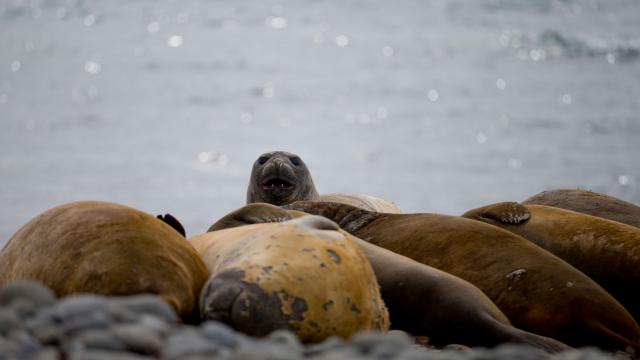Meltwater from Antarctic glaciers is changing the makeup of the region’s oceans more than previously known, a new study finds. The measurements that made these findings possible were collected by an unusual group of researchers: seals.
The study, published Friday in Communications: Earth and Environment, uses measurements of water temperature and salinity to show how glacial meltwater is changing the makeup of the ocean near the Pine Island Glacier, one of the fastest-retreating glaciers on the continent. The researchers found that the warmer, fresh meltwater was distributed in patches throughout the ocean, including portions rising near the surface. Those surface layers bring up iron and other nutrients to the top of the ocean, encouraging algae and other biomass to grow as well as keeping the ocean relatively ice-free.
“In this part of the sea, the glaciers are melting so fast, they call them ‘Doomsday Glaciers,’” Yixi Zheng, the lead author of the study and a postgraduate researcher at the University of East Anglia, said. “We really care about what’s happening in that region. We want to know how fast they’re melting and the impact of those glaciers to the climate system.”
While glacial meltwater is best measured in winter, when its hydrographic signature is clearest, this has always posed a problem for scientists. Pine Island Glacier is not only extremely remote, but the ocean near the glacier is covered by ice 10 months out of the year, making access to deeper parts of the ocean with human instruments nearly impossible to obtain.
Seals, however, can and do swim under sea ice. Zheng and her team used a dataset collected by seals swimming near the Pine Island Glacier who were outfitted with sensors that collected water temperature, salinity, and pressure. The seals were then monitored between July and September of 2014.
“The seals, they are so amazing,” Zheng said. “They’re super good at finding small holes in the sea ice. Sometimes I feel like we should give them PhDs. They’re doing better than many scientists.”
As versatile as seals can be, they’re not perfect researchers. You can’t control where a seal’s going to swim, so you can’t ask that they patrol a specific area. That makes them somewhat erratic collaborators, but the team was fortunate with the ones they had.
“We’ve been really, really lucky that in this region. Right in front of the glacier, we had this seal hanging around, having a winter holiday,” Zheng said. It’s not so surprising that a seal would choose to set up shop near a melting glacier: As Zheng’s study shows, the meltwater at the surface of the ocean near glaciers encourages algae, which means more food for seals.
Researchers have used seals in other studies as well. Some of Antarctica’s most charismatic mammals also helped solved what caused a massive hole to form in the region’s sea ice. Scientists have also monitored seals from space as a proxy for how healthy various Antarctic ecosystems are. Those ecosystems support crucial fisheries humans rely on, and what happens to the continent’s massive stores of ice has implications for populations on coasts around the world. In a region that’s rapidly changing, any extra data researchers can gather so they can get a handle on what’s going on is vital to plan for what comes next.
Zheng, who herself tagged seals on a trip to Antarctica in 2019, said she sees lots of opportunities for seals to help scientists collect measurements, and thinks that seal-tag data is going to become more popular in future studies. The sensors outfitted on seals, Zheng said, cost between roughly $US4,1000 ($52,566) up to nearly $US7,000 ($8,975). That might seem expensive, but it’s astronomically cheaper than sending a team of scientists with expensive equipment to camp out in Antarctica to collect similar data.
“We really love seal tag data, and we’re trying to make the most of them,” Zheng said.
